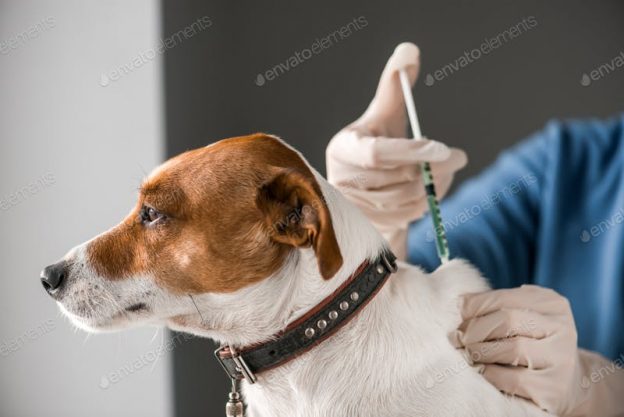
We vaccinate our kids, so should we be vaccinating our dogs too? Carrol Baker discovers just how important these life-savers are for our pets.
Vaccinations aren’t much fun, but they’re part of life for your dog. Just as humans benefit from vaccinations to prevent diseases like mumps or the flu, your dog should be vaccinated against certain diseases such as canine parvovirus that can affect the canine population.
Are your dog’s vaccinations up-to-date? Perhaps you think your dog doesn’t need vaccinations because it doesn’t mix with other canines, or that dogs only need vaccinations when they’re puppies. Neither of these are true. Dr Geeta Saini, president of the Small Animal Interest Group of the Australian Veterinarian Association (ASAVA), says there are very good reasons for keeping your dog’s immunisation schedule up to date.
“Vaccinations keep dogs safe from potentially life-threatening diseases,” she says. “They also reduce the risk of the spread of communicable diseases in the general canine population.” Vaccinating your pet is also far less expensive than treatment if your dog contracts a preventable disease.
Dr Geeta explains that vaccines work by producing antibodies to ward off particular infections. “They stimulate the immune response in the body so if the animal does get infected by the disease, the body can respond to it and fight it,” she says.
Vaccinations are broadly divided into two types: core, which are to prevent potentially life-threatening diseases, and non-core, giving protection to diseases that are not usually fatal (but still cause significant illness). Your vet will recommend vaccines to protect against canine distemper virus, canine adenovirus (which causes infectious hepatitis) and canine parvovirus (C3), and will also advise you to vaccinate against canine cough. If you live in tropical North Queensland or the Northern Territory your vet will probably recommend vaccination against leptospirosis, an often fatal infectious bacterial disease.
Diseases explained
Canine distemper: Attacks the nervous system. Symptoms can include high temperature, loss of appetite and lethargy, and can lead to paralysis and seizures. It’s uncommon now due to the widespread effectiveness of the vaccination.
Infectious hepatitis: Caused by the canine adenovirus, which attacks the liver. Symptoms can include fever, diarrhoea and abdominal pain. The virus is spread in bodily fluids of affected dogs. Very rare. Can be fatal in puppies.
Canine parvovirus: Attacks the dog’s gastro-intestinal tract. The virus is spread in soils and contaminated dog faeces. Symptoms can include fever, vomiting and diarrhoea. Not uncommon in some areas. Very high mortality rate unless early treatment is sought.
Canine cough: Spread in areas where dogs socialise; symptoms include a hacking cough, fever and loss of appetite. Parainfluenza is the viral component of canine cough and Bordetella bronchiseptica is the bacterial component. Even after treatment, the cough can persist for a long time.
Puppy’s first vaccines
When a puppy is born, it’s temporarily protected by maternal immunity. The colostrum in the mother’s milk in the first 24 hours after birth protects the puppy for up to 16 weeks, explains Dr Geeta. But this immunity starts to decrease markedly by six weeks of age.
Puppies are usually given three lots of core (C3) injections four weeks apart, starting at six, then 10-12, and 16 weeks of age. Vaccinations for canine cough are also given. Once your puppy is vaccinated, it needs a 12-month booster.
Ongoing vaccinations
Vaccinations in adult dogs are given annually, with some vaccines able to be given triennially (every three years). In the past, all vaccinations were administered annually, however guidelines from the World Small Animal Veterinary Association and the Australian Veterinary Association have changed in the last few years. This is because scientific evidence suggests some vaccines have protective capabilities longer than a 12-month period. However, it isn’t always clear-cut, according to Dr Geeta. “Whether your pet is offered a triennial or annual injection for C3 can depend on your demographic,” she says. “Some of these viruses are more prevalent in certain areas.” Canine cough, however, remains an annual vaccine.
Even if your dog doesn’t socialise with other canines it should be vaccinated as some diseases, such as canine cough, are airborne. Sometimes pet owners can also accidently bring viruses into the dog’s environment, for example on the soles of their shoes.
Rarely there may be minor side-effects after vaccination such as localised pain at the injection site, or a small lump, or you might notice your dog is a little lethargic. That soon passes. Prolonged or adverse reactions are extremely rare, says Dr Geeta.
Annual health checks
Even with the introduction of triennial C3 injections, your dog still needs an annual health check. On examination, your vet can give your dog a thorough once over to determine any other health issues you may be unaware of.
Heartworm injection
There’s an easy way to prevent your pet from contracting heartworm if you have trouble remembering a monthly tablet. The injection is a slow-release formula that prevents heartworm (a mosquito-borne parasite) from developing, ensuring 12 months’ protection from a single dose administered by your vet.
Make sure your furry friend is always looked after at our DOGSLife Directory



